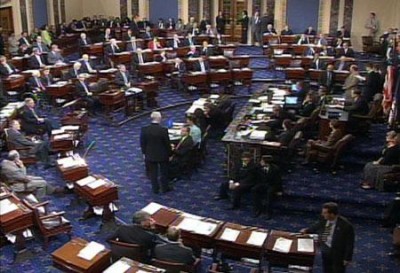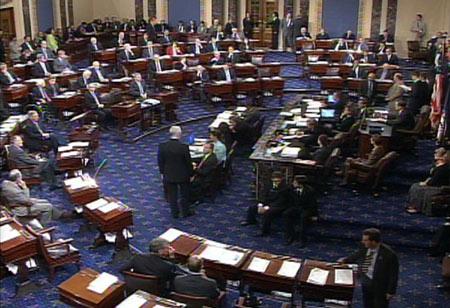
Contact: Sarah Anderson, sarah@ips-dc.org, tel: 202 787 5227 or 202 299 4531 (cell)
A bill introduced late yesterday by Senators Richard Blumenthal (D-Conn.) and Jack Reed (D-R.I.) would close a loophole that currently serves as a taxpayer subsidy for excessive CEO pay. The Institute for Policy Studies has been calling for a fix to this outrageous glitch in the tax code for two decades.
Under current rules, corporations can deduct unlimited amounts off their income taxes for the expense of executive stock options and other so-called “performance-based” pay.
“The more corporations pay their CEOs, the less they pay in taxes,” notes Sarah Anderson, a co-author of 19 annual IPS executive compensation reports. “This loophole creates a perverse incentive to pay executives excessive amounts, while ordinary taxpayers wind up paying the bill.”
The just-introduced bill, the “Stop Subsidizing Multimillion Dollar Corporate Bonuses Act (S.1746),” would cap the tax deductibility of executive pay at $1 million, with no exceptions for “performance-based” or commission-based pay. The cap would extend to all employees of all companies that are required to file periodic reports with the Securities and Exchange Commission.
In May 2013, IPS published a report that was the first to put a price tag on the tax breaks specific corporations have enjoyed from this loophole. The report found that the 90 publicly held corporate members of the ‘Fix the Debt’ lobby group raked in at least $953 million — and as much as $1.6 billion — from the “performance pay” loophole between 2009-2011.
UnitedHealth Group enjoyed the biggest taxpayer subsidy for its CEO pay largesse during this period. The nation’s largest HMO paid CEO Stephen Hemsley $199 million in total compensation, of which at least $194 million was fully deductible “performance pay.” That works out to a $68 million taxpayer subsidy – just for one individual CEO’s pay. In 2012, Hemsley pocketed another $28 million in “performance pay,” which computes into a tax break for UnitedHealth of nearly $10 million.
“At a time when Congress is considering major cuts to basic services for ordinary people, it’s unacceptable to continue to allow highly paid CEOs to benefit from this loophole,” says IPS Associate Fellow Scott Klinger.
FORTHCOMING CEO PAY REPORT: On August 28, IPS will release the 20th anniversary edition of “Executive Excess.”The report looks at the top 25 highest-paid CEOs for each of the past 20 years. It calculates how many of these “successful” top executives wound up getting fired, led firms that received financial bailouts, or had to pay massive fines or settlements for fraud.
The report will add to the evidence of a broken CEO pay system and lay out a comprehensive agenda for reform, including a fix for the tax deductibility loophole. Past editions of the IPS “Executive Excess” report have received widespread media coverage, including in the New York Times, Wall Street Journal and Washington Post. To request an embargoed advance copy of “Executive Excess 2013,” contact: Sarah Anderson, sarah@ips-dc.org.
Executive compensation experts available for comment:
Sarah Anderson directs the Global Economy Project at the Institute for Policy Studies and has co-authored 19 IPS annual reports on executive compensation. Contact: sarah@ips-dc.org, 202 787-5227 (office) or 202 299 4531 (cell).
Scott Klinger, an Institute for Policy Studies associate fellow, crafted the first shareholder proposals on executive pay while working as a social investment portfolio manager. He has also written extensively on corporate tax avoidance. Scott is a CFA charterholder. Contact: ScottKlinger@earthlink.net.
Sam Pizzigati, an IPS associate fellow, is the author of the The Rich Don’t Always Win: The forgotten triumph over plutocracy that created the American middle class, 1900-1970 (Seven Stories Press). He also edits Too Much, an online weekly newsletter on excess and inequality.
Institute for Policy Studies (IPS-DC.org) has conducted path-breaking research on executive compensation for 20 years. The 2012 edition of their annual Executive Excess report received significant media coverage, including in the Wall Street Journal and New York Times.
IPS Media Director: Lacy MacAuley, Institute for Policy Studies, (202) 445-4692 main, (202) 234-9382 second, lacy@ips-dc.org
